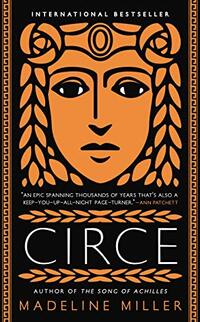|
Circe by Madeline Miller is a re-imagining revolving around the life of Circe, who played minor roles in Greek mythology. This book heavily involves many other Greek myths, and incorporates them in a way that flows naturally. The inclusion of the creation of the Minotaur was an unexpected and somewhat disturbing development, but it added validity to Miller’s tale, as it showed that each character is more than one dimensional -- having their own motivations, however misguided some may be. I appreciated that Circe’s character was expanded upon throughout this story, and that she did have character development. Whereas other gods or immortals may have a set mindset that is unwavering, especially regarding human fragility, Circe grew to understand humanity, and to see past the pettiness of the gods. While there is a large theme of mortality throughout this novel, I won’t be contemplating such topics, as I’ve dove into that in previous posts.
Despite Circe being the main character, Miller did well when it came to developing side characters, some of which took the spotlight, even if it was very briefly lived. For example, the inclusion of Daedalus and his son, Icarus, not only helped to humanize Circe, but was in itself a tragic tale that could be related to. Aside from human characters, the character I found myself most drawn to was Trygon, who ended up being my favorite character. Unlike other gods portrayed in this story, he isn’t humanoid, but rather an ancient being dwelling beneath the depths. Trygon also doesn’t require Circe to go through with proving herself in order to obtain his tail as a weapon, and spares her from having to endure eternal pain. This ancient sea entity is somewhat reminiscent of Lovecraftian horror, while also being honorable; I’ve always enjoyed analyzing horror media. Another character that left me with a distinct impression was that of Hermes. Throughout this novel, Hermes acts as a trickster god, which leads to the correlation between Loki and Hermes. As Loki is a more recent trickster that shows up across media, especially in Marvel, it was the first connection I made. Regarding Circe, I thought it was commendable that she finally stood up to Helios, ending her imprisonment and being free to roam the Earth by the end of the novel. However, the ambiguity of the ending, while appreciative, was also frustrating, as her wish to forego immortality was left unanswered. It would have been nice to at least get a glimpse towards her future being as bright as she imagined it to be, but the novel was cut off right before that point.
0 Comments
|
Archives
November 2021
Categories |

 RSS Feed
RSS Feed
